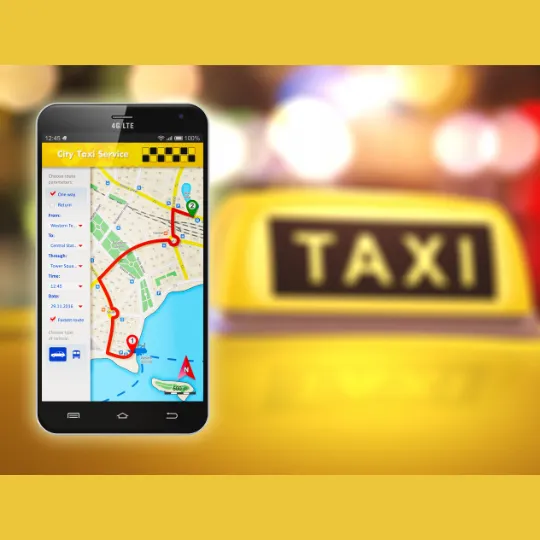Because of how easy and quick these applications make it possible to get a ride, the world market for apps that let you book a taxi is forecasted to hit 100 billion.
If you make taxi apps or one who is a business person wanting to know how to make a taxi booking app, then it is quite essential to understand these apps very well to stay ahead of the competition. This guide explains all you need to know to create and run a taxi booking app that does well.
Want to elevate your taxi booking business? Our expert developers are here to develop the perfect taxi booking app. Contact us now!
Understanding the Basics of Taxi Booking Apps
What is a Taxi Booking App?
A taxi booking application is a mobile application that allows users to book a taxi ride directly from their smartphone. Such applications feature varied innovative ideas, like real-time tracking, an estimate of the fare amount, and many other pay-out modes that can make transportation easy and efficient for its customers.
Importance of taxi booking apps
Demand for taxi booking applications has been high in recent times. Over 60% of the country's urban population uses a ride-hailing service. With this, the taxi booking application market is all set to boom. For a taxi app developer, this trend can be capitalized upon by understanding and taking recourse.
See Also: How To Find The Perfect Taxi Booking App For Your City?
Steps to build taxi booking apps
Step 1: Research and planning
Market research
Before creating a taxi booking app, do deep market research about your target audience and the competition. Find gaps in the market, service as well as the functionality of an app. This way you design an application that users would need, and that differentiates one from another.
Define your objectives
What is it that you are trying to achieve with your taxi booking application? Do you want to increase the ease of customers, expand your business reach, or improve service efficiency, for which clear objectives will guide your development process?
Step 2: Choosing the right platform
Android vs iOS
Decide whether you will build the app for Android, iOS, or both. Although domination of an app for Android leads to a higher percentage share in the world market, iOS users spend much more on apps. You take into account the preference of your target audience while making this decision.
Cross-Platform development
During cross-platform development of the taxi booking app using React Native or Flutter, you can build this app for both platforms simultaneously using less time and resources required.
Step 3: Essential features of a taxi booking apps
User registration and profiles
There should be an option for users to sign up by email, phone number, or even social media. Friendly user profile configuration will improve overall user satisfaction.
Booking and Scheduling
Make it easy for a customer to place bookings and schedule rides. It must have an instant provision for booking. Advanced scheduling capabilities and the possibility of recurring rides will cater to other types of users.
Real-time tracking
Integrate GPS technology to track the rides in real-time. This will not only ensure greater safety and transparency for both users and drivers.
Payment integration
Payment can be facilitated through credit/debit cards, digital wallets, and even cash. The payment process should be smooth and secure.
Ratings and Reviews
Let the riders rate and review their rides. This feedback mechanism will prove useful for you to maintain high service standards and rectify the issues on time. Enhance your app based on customer reviews.
Step 4: Design and User Experience
Intuitive interface
A simple user-intuitive interface is a recipe for user intention. Ensure your app easy to navigate with clear instructions and minimum clicks for a ride booking.
Visual Appeal
Clean modern design with pretty visuals. Consistent branding and nice color scheme will really enhance the whole experience.
Step 5: Development and testing
Choosing the right technology stack
Choose a tech stack appropriate to your app's requirements. You have got options for Swift for iOS, Kotlin for Android, and Node.js or Python for the backend.
Rigorous testing
Thorough testing is done to detect bugs and remove them. Unit, Integration, and user acceptance tests are done to ensure that the application is robust and reliable.
Step 6: Launch and marketing
App Store Optimization (ASO)
ASO is the optimization of your app's listing on app stores for better visibility and downloads. Use relevant keywords, appealing screenshots, and a compelling description in creating your app's listing for better display in the app stores.
Marketing Strategies
Engage with people: Use your app via social media, email marketing and partnership. You can offer discounts and referral programs to attract more users.
See Also: How Can Ride-Sharing Integration In Taxi Apps Be Done?
Advanced tips for mastering taxi booking apps
Leveraging data analytics
Using data analytics on the behavior of users such as what they like and their trend, you might have made some proper decisions to make the app better.
Enhancing Security
Ensure that your app maintains data security and follows data protection requirements with robust security elements. User information must be kept confidential for the sake of trust and credibility.
Staying Updated
Ensure to stay in pace with the current trends and technologies emerging in the taxi-booking app industry. Regular up-gradations with new features will keep your app relevant in the market to become a competition.
Conclusion
Mastering taxi booking apps is highly multi-dimensional because of the vast research and planning involved with continuous improvement. This step-by-step guide helps you in creating a successful taxi booking application that achieves user requirements and stands out in a highly competitive market. It will, therefore, benefit aspiring taxi app developers or a business owner to know and navigate around the complex industry of the taxi scheduling app.
Are you interested in enhancing your taxi booking business? Our team is here to develop the perfect taxi booking app. Contact us now!
FAQs
Q1: What are the essential features of a taxi booking app?
A taxi booking app should include user registration and profiles, booking and scheduling options, real-time tracking, multiple payment integration, and ratings and reviews. These features ensure a seamless and user-friendly experience.
Q2: How can I choose the right platform for my taxi booking app?
Decide whether you want to develop your app for Android, iOS, or both based on your target audience. Android has a larger global market share, while iOS users tend to spend more on apps. Cross-platform development tools like React Native or Flutter can help you create an app for both platforms simultaneously.
Q3: What steps should I take to ensure my taxi booking app is secure?
To ensure security, comply with data protection regulations, incorporate robust security measures such as encryption, and secure payment gateways. Regular security audits and updates are also essential to protect user data and build trust.
Q4: How can I optimize my taxi booking app for better visibility and downloads?
Optimize your app's listing on app stores through App Store Optimization (ASO). Use relevant keywords, appealing screenshots, and a compelling description. Additionally, promote your app through social media, email marketing, and partnerships to attract more users.
Q5: What are the benefits of using data analytics for a taxi booking app?
Data analytics provides insights into user behavior, preferences, and trends. This information helps you make informed decisions, improve your app’s performance, enhance user experience, and stay competitive in the market.


_thumb.webp)
_thumb.webp)















